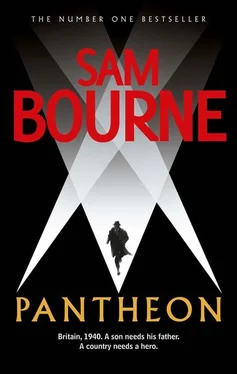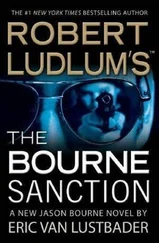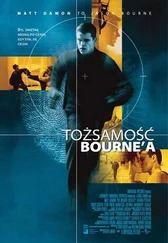Sam Bourne - Pantheon
Здесь есть возможность читать онлайн «Sam Bourne - Pantheon» — ознакомительный отрывок электронной книги совершенно бесплатно, а после прочтения отрывка купить полную версию. В некоторых случаях можно слушать аудио, скачать через торрент в формате fb2 и присутствует краткое содержание. Жанр: Триллер, на английском языке. Описание произведения, (предисловие) а так же отзывы посетителей доступны на портале библиотеки ЛибКат.
- Название:Pantheon
- Автор:
- Жанр:
- Год:неизвестен
- ISBN:нет данных
- Рейтинг книги:3 / 5. Голосов: 1
-
Избранное:Добавить в избранное
- Отзывы:
-
Ваша оценка:
- 60
- 1
- 2
- 3
- 4
- 5
Pantheon: краткое содержание, описание и аннотация
Предлагаем к чтению аннотацию, описание, краткое содержание или предисловие (зависит от того, что написал сам автор книги «Pantheon»). Если вы не нашли необходимую информацию о книге — напишите в комментариях, мы постараемся отыскать её.
Pantheon — читать онлайн ознакомительный отрывок
Ниже представлен текст книги, разбитый по страницам. Система сохранения места последней прочитанной страницы, позволяет с удобством читать онлайн бесплатно книгу «Pantheon», без необходимости каждый раз заново искать на чём Вы остановились. Поставьте закладку, и сможете в любой момент перейти на страницу, на которой закончили чтение.
Интервал:
Закладка:
He dashed across, heading into a building that still stood out for its novelty. Where almost every other structure in the town was covered in grime, stained with the soot generated by coal fires in every room, the brick of the New Bod was still a pristine beige. Not only was it clean but it was made of straight lines, free of the gargoyles, gnarled brickwork and battlements that made university Oxford resemble a walled city from the Middle Ages. That gloom had only deepened thanks to the strictures of the blackout, demanding that every college cover its windows in blinds or curtains or, when supplies of those had run out, brown paper or even black paint. At first, pride ensured that the curtains were drawn back or the paper removed each morning. But staff were short and so was patience, and so, with the war now in its eleventh month, many of Oxford’s medieval or Tudor windows remained cloaked in darkness all day long.
And to think it had only opened a year ago: James and Florence had gone together, invited as the Greys’ guests. The speeches had looked forward to a bright future, full of dreams for the scholars of the next generation. Even at the time, James remembered, those seemed to owe more to hope than expectation. Only the hopelessly deluded, or those fanatical for appeasement, believed war could be avoided. For some, like James, the war had begun long ago.
Sure enough, the New Bodleian was closing its doors. ‘Have to wait till tomorrow now, sir,’ said the commissionaire, producing a key from his belt in the manner of a gaoler.
‘Of course,’ James replied. ‘I just need to retrieve some notes I’d left in one of the reading rooms.’
‘Opening hours are nine am till-’
‘Yes, yes, I know the opening hours. But-’ He leaned in, his voice dropping to a whisper. ‘This is for the, er, war effort. If you get my meaning.’
The doorman pulled back as if to assess James’s honesty from a distance. All he had to do was feign confidence. That, his instructor back in Spain had told him, was the key. So he held the commissionaire’s gaze, convinced in his own mind that he was engaged in intelligence duties at Balliol or Oriel, until the man eventually stepped out of his way, gesturing him towards the stairs.
He noticed that the landings were full of what he guessed were paintings wrapped in brown paper and string, stacked together against the wall: those must be the artworks he had heard about, brought here for safekeeping. All the colleges were doing it, emptying out their collections, even removing stained glass windows and statuary, using the newly-built Bodleian building as their refuge. And not just the colleges. The House of Lords library had sent some of the nation’s most precious documents here, packed into four tins — among them the death warrant of Charles I. Quite why they thought such treasures would be safer here than anywhere else in Oxford, James was not sure: perhaps they simply put their faith in the modern.
On the first floor, he could see a last remaining librarian, a woman around his age. She had a wireless set on her desk and it was switched on, a sign not only that she was off-duty and packing up for the day but also of how different life had become: you would never have seen a wireless in a library before, but everyone was glued to the device these days, awaiting word of the war. As he approached the desk, he heard the BBC announcer conclude that afternoon’s play, Adolf in Blunderland. Some satirical effort aimed at lifting the nation’s spirits, James guessed.
The woman turned around. She looked nothing like Florence but something in the brightness of her eyes reminded James of his wife and, for a split-second, it seemed to suck the wind out of him. In that instant he was somewhere else entirely, in a pokey little cafe not far from here — The Racket — where, thanks to rationing, he and his wife had had to make do with a supper of baked beans on toast. They had been arguing, he had gone too far and she had calmly got up and walked out, leaving him to face the embarrassed stares of the staff and the other diners. He had run out after her, searching street after street, eventually finding her just a few hundred yards away from their home. They had patched it up, he couldn’t remember how. But for nearly an hour he had feared that he had lost her. And something in this woman’s face brought back that fear now, made him realize he had been fending it off all day.
‘I’m sorry, sir, the library is now closed for the day. We will be open again tomorrow morning.’
James stared back at her, suddenly unsure what to say, where even to begin.
‘Sir?’
She had dipped the volume on the wireless, but he could hear the start of the six o’clock bulletin: something about Vichy France formally breaking off diplomatic relations with Britain. Unplanned, he began to speak. ‘I’m afraid something serious has happened. My wife has gone missing. One of the last places she was seen was here. I’d like to know what she was here for. It may enable us to find her.’
The woman blinked a few times, then glanced over James’s shoulder, as if checking to see if anyone else was around. ‘The rules are quite strict on-’
James looked directly into her eyes. ‘I quite understand that. And that’s how it should be. But this is quite an exceptional situation.’ She said nothing, which he took as a good sign. ‘I’m desperately worried for her, you see.’
‘I’d like to help, but the request forms are not kept here. I’d have to-’ She looked away again, towards a door just behind her. He couldn’t tell if she was worried that someone might come — or hoping that they would. She was a woman alone in a large, empty building with a man who had just described himself as desperate.
’Would you? I really would be extremely grateful.’
Speaking hurriedly, conscious that she was breaking the rules, she handed him a yellow slip and asked him to write on it the name of the lender concerned. ‘And the date please, Mr…’
‘Zennor. Dr James Zennor.’
She took the piece of paper, turned and went through the door behind her. James looked upward then around, taking in the vast room. He had barely visited here since the opening: he preferred to do his reading in the Radcliffe Camera, where he came across fewer of his colleagues. But Florence had embraced it right away. ‘Just think: I will be one of the very first scholars to have worked in a building that will probably stand for a thousand years.’ She paused, then gave him that smile he could not resist. ‘I like being first.’
He began to pace, looking at the rows of desks, new and barely scratched — lacking the dents, cracks, blemishes and the gluey, human resin accreted through centuries that coated the wood at the ‘Radder’. He looked at the clock. The librarian had been gone more than five minutes, closer to ten. He wondered what could possibly be keeping her.
Where on earth would Florence have gone? Mrs Grey was right: the obvious answer was her parents’ house, but he had ruled that out. He could feel a swell of anger rising inside him. He needed to see what the hell Florence had been looking at here. It could be her regular studies, Darwin and the like, but it could be something else, something more urgent. What was it Grey had said? Something she had to check, something she had to find out, before she could leave.
So what the hell was it? What had Florence had to find out? And where was that damned librarian?
He marched at full speed past the administrative desk, breaking through the invisible barrier that separated clerks from readers, and through the door the librarian had taken nearly quarter of an hour earlier.
Behind it, he found himself on a landing for a service stairwell. Dimly lit by a single sickly bulb, it was painted a functional grey, the floors covered in a thin linoleum. Instinctively he headed downstairs.
Читать дальшеИнтервал:
Закладка:
Похожие книги на «Pantheon»
Представляем Вашему вниманию похожие книги на «Pantheon» списком для выбора. Мы отобрали схожую по названию и смыслу литературу в надежде предоставить читателям больше вариантов отыскать новые, интересные, ещё непрочитанные произведения.
Обсуждение, отзывы о книге «Pantheon» и просто собственные мнения читателей. Оставьте ваши комментарии, напишите, что Вы думаете о произведении, его смысле или главных героях. Укажите что конкретно понравилось, а что нет, и почему Вы так считаете.












